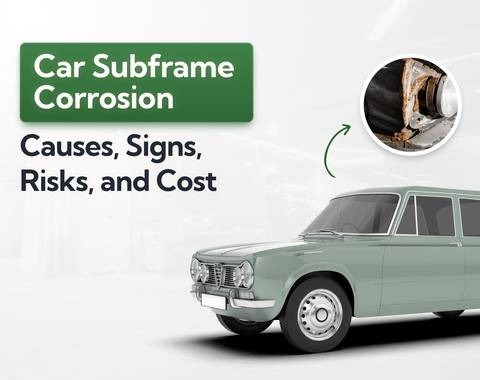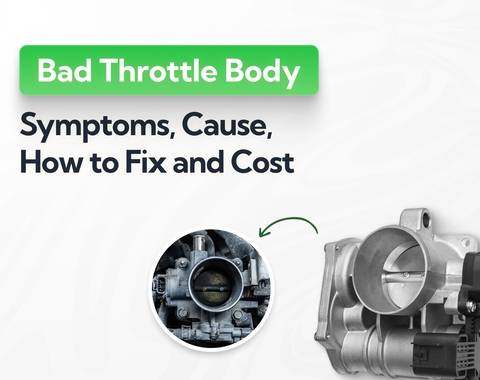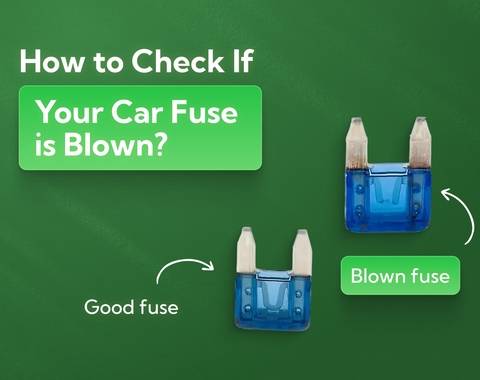What are Cat A, B, C, D, S & N Vehicles
Explore UK insurance write-offs: Cat A, B, C, D, S & N vehicles. Learn how they work, when you can repair and sell them and tips to navigate the process.
Last updated: 14th October, 2025

Award-winning automotive entrepreneur, tech innovator, and founder of Car.co.uk, NewReg.co.uk & Recycling Lives.

Listen to this story
If your car has been in an accident or has otherwise sustained significant damage, it might not be worth repairing (at least according to your insurance provider). If you wind up in a situation where you want to sell it anyways, the category your write-off falls under determines whether that's possible.
Especially in the case of very serious accidents, it's common for the repair costs to exceed the value of your car. When this happens, the car insurance company will declare it a write-off.
When they write off your car, they will give it a salvage title. Then, they will scrap the car, and you will receive a settlement figure. You can use the settlement money to pay off any existing finance, purchase a new car or carry on with your life without replacing it.
Sometimes, the payout doesn't cover the full cost of settling your outstanding loan balance and getting a new vehicle. Others, the car is in repairable condition, so you want to sell it on your own terms. You may also have an attachment to the vehicle, which only you can put a value on.
There are times when you can sell a written-off car. There are times when you can't. That all depends on whether your car is a Category A, B, C, D, S, N, U or X.
What's in this article
What is an insurance write-off?
You will have to file an insurance claim whenever something happens to your car (e.g., an accident). When it comes time to repair it, they will cover the costs (minus the deductible).
When your car is involved in a serious accident, natural disaster, theft or any other event that results in significant damage, repair costs are extremely high. If bringing the car back up to standard would cost more than its market value, your insurer will write it off as a total loss. They will do the same thing if the vehicle is damaged beyond any possibility of repair.
In short: An insurance write-off is a vehicle your insurance provider deems impossible to repair or not worth repairing based on the cost of repair versus the car's value.
There are 8 categories of insurance write-offs in the UK: A, B, C, D, S, N, U and X.
Category A
Category A is the worst possible insurance write-off. It means that the car is so badly damaged that there are no salvageable parts. They must be completely scrapped without exception, and it is illegal to sell them or repair them in any way.
Most of the time, a Category A write-off is the result of a serious collision that crushed the bodywork, twisted the chassis or completely fried the internal electrical components.
Category A write-offs aren't issued due to unfeasible repair costs. The insurance company issues them to cars that are actively dangerous. They're regarded as significant risks to human health due to electrocution risk, toxicity or physical dangers like jagged metal.
Category B
Category B write-offs are required by law to be scrapped. They're not allowed on the road, and they can't be repaired or sold as-is.
Unlike Cat A write-offs, Cat B vehicles may still contain salvageable parts. The bodywork is too badly damaged to get back on the road, so it must be crushed. But a few parts (such as the stereo or seats) may be in good enough condition to fetch a price on the second-hand market.
With a Category B write-off, the salvageable parts will be specifically listed out in the official salvage report. They will be marked as safe to remove and sell, but it is a criminal offence to sell anything other than the parts on that list.
Category C
If you have a classic car that was involved in an accident or natural disaster, you might come across Category C. It's not very common (since retro cars themselves aren't that common).
All it means is you can repair the vehicle and put it back on the road. It will just cost more than the vehicle's worth to do so.
For what it's worth, keeping or selling a classic car is one of the main cases for repairing a write-off in the first place. They carry sentimental value, which often outweighs the financial losses. For experienced sellers, classic cars can also be a lucrative trade.
Category D
With Category D cars, the issue isn't the repair work (repairs are actually less than the vehicle cost). Additional fees — such as recovering the vehicle and transporting it — push the costs beyond what it's worth.
This is common in some specific circumstances, such as when a motorist drives the vehicle off of a hill or into a building in an accident. They may not have hit anything, but retrieving the car involves additional work that costs lots of money.
Some see Category D as an indicator that fixing the car is within reach. Since the write-off is an economic decision the insurer makes, they factor in the costs of recovery and transport when writing it off.
Once you have the car, you won't necessarily have to worry about those things. So — while you won't make much (if any) money from the transaction — trying to sell a Category D car isn't the craziest thing in the world.
Category N
Category N is one of the two most common write-off categories. Simply put, it's a salvage title indicating the vehicle was damaged beyond economical repair.
Category N vehicles sustained no structural damage. Instead, they're written off because the cost of replacing and repairing the paint, interior, wiring, electronics or other internal/cosmetic damage exceeds the car's market value.
Sometimes, it's easier to sell a Cat N car than a Cat S car because buyers will question the safety less if there is no structural damage.
Category S
Category S is the other most common write-off category. It's an insurance label for vehicles that sustained structural damage but are potentially repairable.
Just like Cat N, Cat S vehicles aren't economically feasible for the insurance company to fix, but there are no legal barriers to fixing it up yourself and selling one.
Structural damage is usually more expensive to fix than non-structural damage, so you'll have to do a careful cost-benefit analysis if you're considering selling it as an option.
Category U
Category U is a relatively new write-off categorization. U stands for 'Unrecorded', and indicates the details around the accident and its circumstances are hazy (or partially unknown).
There are a few reasons to declare a Category U write-off:
- The driver doesn't have insurance. When the driver of the vehicle at the time of the collision is uninsured, there's no way to formally record the situation. With no insurer available to take responsibility, the police seize the vehicle and either scrap it or declare it Category U.
- The driver only had third-party insurance. If the driver was involved in an accident that didn't involve anyone else, having only third-party insurance (i.e., the bare minimum), the insurer wouldn't cover the vehicle costs. If the owner themselves also cannot cover them, it is classed as Category U.
- The car was stolen and recovered much later (usually after 8 weeks). In these cases, it differs from the other categories in one distinct way: The car may drive perfectly fine, but the damage done by thieves (or vandals) is substantial. They've broken various locks, windows and other components, which leads to a write-off status.
Like Cat N cars, selling a Category U car is often easier than a structural damage one. The buyers may still worry about the underlying problems that led to the theft, but they won't have to worry about structural integrity.
Category X
Category X is seen as the most desirable insurance write-off category, especially when it comes time to sell. It often doesn't appear as an individual label.
A car is classed as Category X when it has been subject to an insurance claim, but sustains no (or almost no) damage whatsoever. In other words, it remains perfectly intact and safe to drive.
Category X is especially common with theft claims, where a stolen car is found shortly after without any damage done to it. The owner gets back their car, often in a similar condition they left it.
When a car is reported stolen, the insurer will cover it. When it's found, they'll issue a salvage title since they already paid out the claim.
Is selling a written-off car a viable option?
Maybe, but probably not.
Think of it this way: Insurance companies are in the business of making money. If, after decades of insuring millions of vehicles, they decide paying you a settlement figure and scrapping the car is more feasible than repairing the car, that should tell you something.
If you aren't an auto trader or car industry expert yourself, you probably have no business trying to sell a written-off car. Doing so would almost certainly require more effort than it's worth. Plus, it'll end up costing you time and money.
We're going to be honest with you. Trying to sell your written-off car basically means trading 20+ hours of your time (plus lead time for repairs) just to lose thousands of pounds. Especially if you plan to sell your car privately, it just isn't a great idea.
You also have to consider the fact that very few buyers are interested in written-off cars, and those that are tend to ask for a steep discount. You'll have to bend over backwards proving your car's integrity to a smaller pool of buyers.
There are just a few specific circumstances where selling your salvage car might be a better choice:
- The car is a classic that you are fairly certain will appreciate in value.
- Your insurance provider gave you a very low settlement figure.
- The car has sentimental value (e.g., a family heirloom).
- The car has little or no damage (e.g., certain Category N, S, U and X circumstances), so you can fix it fairly quickly and inexpensively.
Unless you find yourself in one of these situations, don't try selling your written-off car — just accept the insurer's offer and move on with your life. There are plenty of other options available, including selling your car for scrap (the insurer will do this) or donating it to charity.
What the experts say

William Fletcher MBE
Factors to evaluate before selling
Selling a written-off car is a huge undertaking. Here's a quick checklist of factors to consider before you choose to list it:
- What is the cost of repairing and restoring the car?
- How long will it take for repairs?
- Is there a demand for the specific model/make in your area (or online)?
- Do you know enough about cars to show the buyer that your car is safe and reliable?
- Is there any residual value in the car? Will you be able to recoup your repair costs?
- What will be the total cost of selling, including repairs, advertising, insurance, and road tax?
Tips to consider when selling an insurance write-off
If you've done a cost-benefit analysis and you're willing to eat the cost of repairs and restoration, you're ready to sell your written-off car (so long as the Category is N, S, U or X).
Assessing the extent of the damage
A write-off doesn't mean your car isn't a good car by any means. It simply means there's no financial reason to fix it, and the insurance company would rather pay you a settlement figure and scrap it. The less valuable your car is to begin with, the more likely you are to receive a salvage title after an accident.
Let's say your car is only worth £2,500 and it gets in a small accident. That's not a whole lot of wiggle room when it comes time to repair, even if it doesn't need much.
Between retrieval, transfer and repairs, you're probably right at the £2,500 mark. It's a numbers game to the insurance company. They'll declare it a write-off irrespective of its current condition.
But every situation is completely different. It's up to you to evaluate your car's condition and determine whether the time and money you'll sink into the repairs are worth it to you.
Researching market value and demand
There isn't an exact formula for selling a car, especially one that's been written off. You'll have to research the market value of similar cars to get an idea of what yours could be worth. Start by using our car valuation calculator (it's free!).
Once you know your car's approximate value on the secondary market, you can start researching its demand in your area (or online). Look up what people are asking for comparable models with similar features and mileage.
You'll have to set your car's price lower than this, of course. And if you’re selling your damaged car as-is, you’ll need to shave off additional value.
To fully understand this technical process, read our guide on how to calculate the value of a salvage car.
Legal and documentation requirements
There are several documents you need to sell your car. If it's a write-off, they're even more important.
- V5C logbook — Selling a car without a V5C is nearly impossible. You'll use it to formally transfer ownership. You'll also use it to tell the DVLA you've sold your car.
- MOT certificate — You won't have an MOT right away because a salvage title states your car isn't roadworthy. Before you can tax the vehicle and drive it again, you need to have a valid MOT.
- Parts receipts — You'll need verifiable receipts from all the parts you fix and replace to prove to buyers they're genuine. These receipts also prove you took the car to a licensed garage or dealer to have the work done.
- Service history — Your service history speaks to how well you cared for your car. If you can prove it was serviced regularly, that adds trustworthiness to your sale and increases the value of the vehicle.
- Pre-accident photos — Photos taken before the write-off will help your buyer visualise what the car looked like before and after the incident.
- Insurance claim history — As proof of the incident and category of the write-off, buyers will want to see a copy of your insurance claim form and the category the insurer assigned.
When selling a written-off car, having all your documents will give buyers peace of mind and help them make an informed decision. During negotiations, this will be the difference between selling for a favourable price and not selling at all.
Exploring selling options
Once you have your documents in order and have a good idea what you can get for your vehicle based on its condition and make/model, you can start exploring selling options.
You have a few options:
- Selling your car to a dealership — Sell or part-exchange your car at a dealer if it's in pristine condition and it's a newer model.
- Selling your car online — Use an online car buying site if you want immediate pickup and payment (your options vary depending on the vehicle's condition).
- Selling your car privately — Selling on your own comes with a lot of risk (and the highest potential payout), especially when you disclose it's a write-off. Avoid car selling scams by vetting your buyers before showing them the car.
- Parting out your car — If you're selling a non-running car, it's a good idea to part it out. It's also a great option if nobody seems to want your car for the full price since it was a write-off.
Understand the pros and cons of selling your car for cash
Most people on the secondary market buy cars with cash. For you, there are some serious advantages and disadvantages.
Pros:
- Immediate cash payment.
- No waiting for bank transfers or cheques to clear.
- Fewer details and documents you need to provide buyers.
Cons:
- Low customer confidence in buying a used car with cash (especially if it's a write-off).
- Potential scams like bounced payments, counterfeit bills and stolen money orders.
- Informal process with limited consumer protection.
The safest way to sell a car for cash is through a reputable buyer (like us!). That way, you get paid on the spot. And you don't have to manage tons of interested buyers or worry about scammers.
Negotiating with potential buyers
Negotiating is a huge part of the car selling process in general. It's even more important when you're selling a written-off car. You'll have to be prepared for buyers who want to pay much less than your asking price simply because of its salvage title.
The best way to negotiate is to stick to your guns. Make sure you point out all the work you've done to fix the car and emphasise that it's roadworthy (we're assuming you aren't selling a car without an MOT, because you shouldn't).
Don't be afraid to walk away if someone makes an offer far below your asking price. After all, it's about more than just money — you want your car to go into responsible hands.
That said, you should be realistic about your car and its situation. A little flexibility will help you feel happier with the offers you get and your eventual sale price.
Ensuring a fair transaction
A 'fair transaction' means two things:
- You get a price you're happy with for your car.
- Your buyer walks away feeling confident and secure about the car they've purchased.
When it comes to selling a written-off car, there are extra steps you'll need to take to ensure a fair transaction.
For starters, you need to be transparent about the car's condition and history. Make sure buyers know it was a write-off, what category of vehicle it is, how much work you did to restore it and anything else you can think of that's relevant.
Have every repair inspected by a licensed mechanic before handing over the keys. Use the copy of the report they give you to assure your buyer of your car's safety and performance.
And prepare your car for sale the right way. Get it detailed before you show it to potential buyers.
Wrapping up: Should I sell my Category _ write-off?
When deciding whether or not to sell your write-off car or take the settlement payout, it all boils down to the category it's classified under.
You're out of luck if it's a Cat A or B write-off — you legally have to scrap it in those cases.
It usually isn't a good idea if it's a Cat S or N, either (though there are exceptions for cars that are clearly in working order, which sometimes happens). The costs of repairing the structural and/or non-structural damage are usually too high for it to make sense.
Usually, the best candidates for resale are Cat U and X write-offs, although there is a case to be made for Cat C and D under certain circumstances.
Frequently asked questions
Some insurance companies won't cancel your insurance cover right away, even if they're writing off your car. To be safe, call your insurance company and cancel your insurance if you decide to take the payout and scrap your car. If you choose to keep it, we recommend keeping the insurance as well.
You can insure a repairable write-off, but you will have to pay higher premiums for it. The insurance company might also ask to inspect the car and make sure it's safe before they'll agree to insure it. Some insurers flat-out won't insure it, so you might have to do some extra research.
Insurance companies typically use the actual cash value of your car, which is the current market value, adjusted for vehicle replacement and depreciation. They also take into account the cost of repairs. If the repair costs plus the car's current value are more than its original worth, they will classify it as a write-off.
You can check if any car was ever a write-off using an HPI Check. This will show you when the vehicle was declared a write-off and whether it was a Category A, B, C, D, N or S. Category U and X write-offs will not show up on an HPI Check due to the nature of these categories.
Vehicle age does not affect the write-off category directly. However, a classic car that isn't economically feasible to repair may receive a Category C write-off instead of a Category N or S. If an older model's market value is a lot lower than the equivalent a few years more recent, it may be classified as Category D instead of not written off at all simply due to its low market value.
Buying a written-off car entails a certain degree of risk. If you choose to buy one, it's important to be aware of all the pros and cons. Make sure you heavily research its history, the circumstances surrounding the write-off, and whether or not its replacement parts are safe and genuine before making a decision.
You must declare a Cat N write-off when selling your car in the UK. It's a criminal offence to omit this information from any advertising or sales documentation. It's also illegal to sell an unroadworthy car, regardless of its write-off status. So leaving out this critical piece of information anywhere can land you in legal trouble if you go through with the sale.
Often, the best place to sell a Cat S car is on the private market. You'll get more for your money, and buyers are usually more willing to take a risk on these vehicles than they would through dealerships. Before you do so, however, it's important to make sure the car is safe and roadworthy — not just because it's illegal to sell an unroadworthy vehicle without disclosure but also for the sake of ensuring a fair transaction between you and your buyer.
About Car.co.uk

Share on
Latest news & blogs










